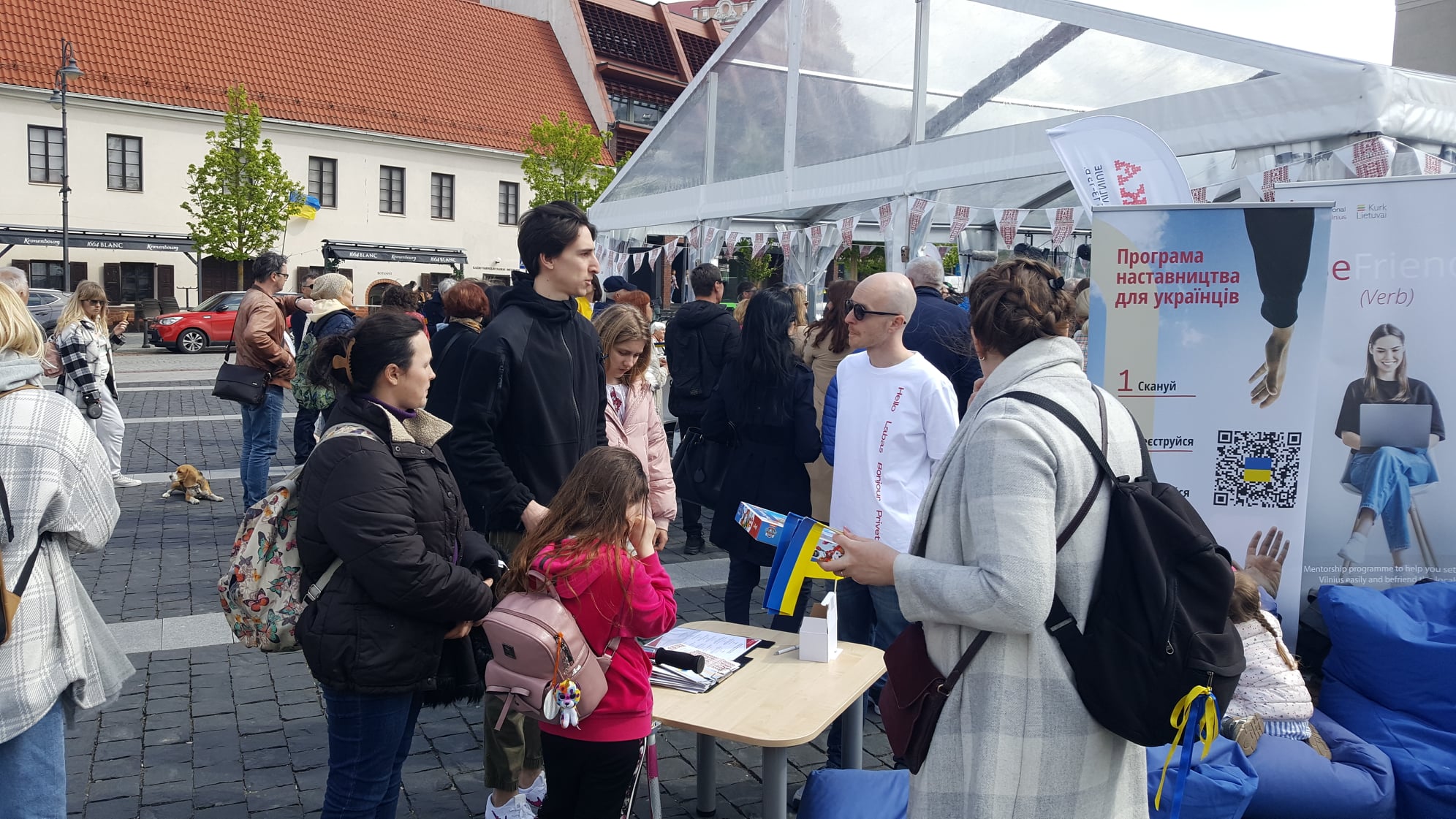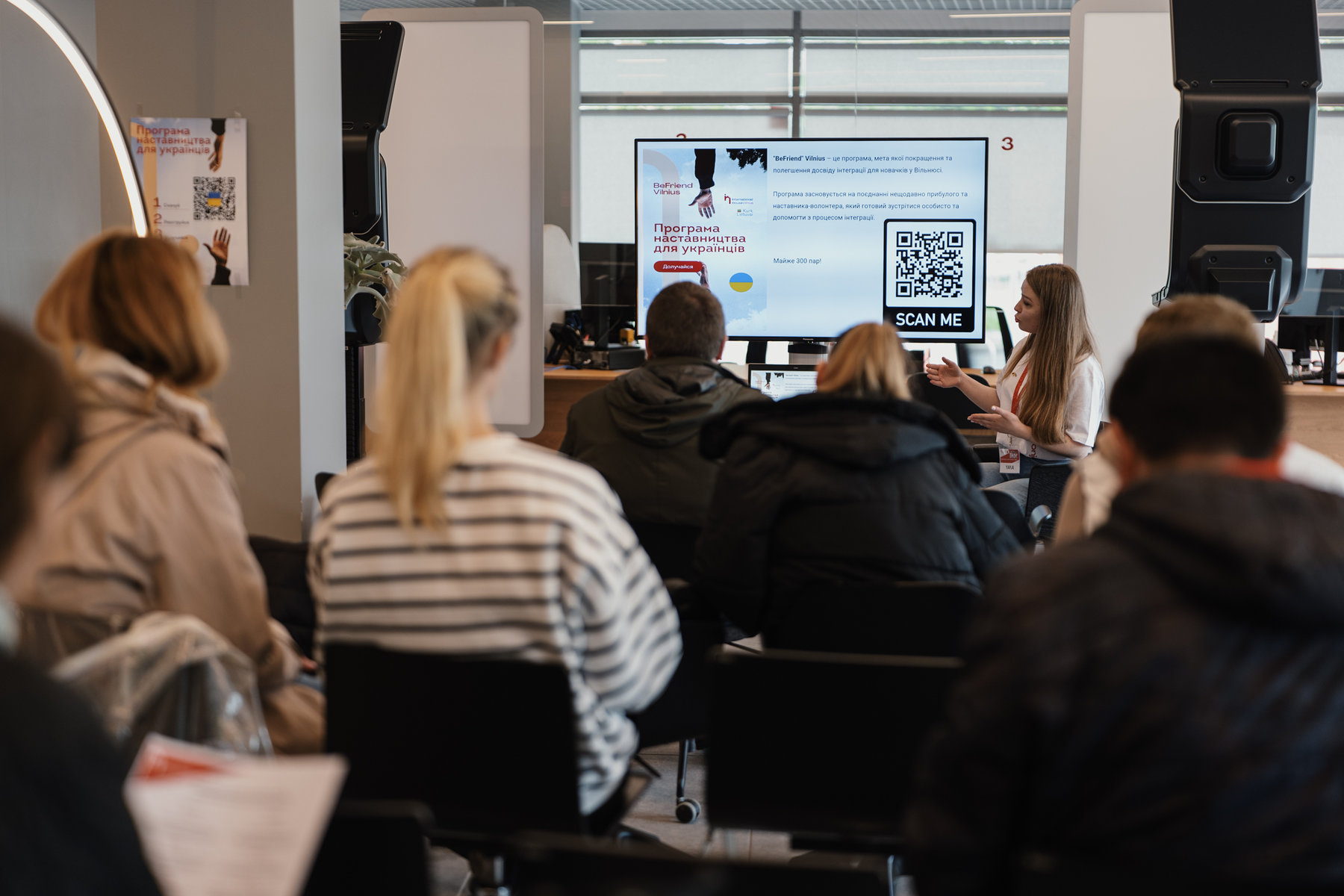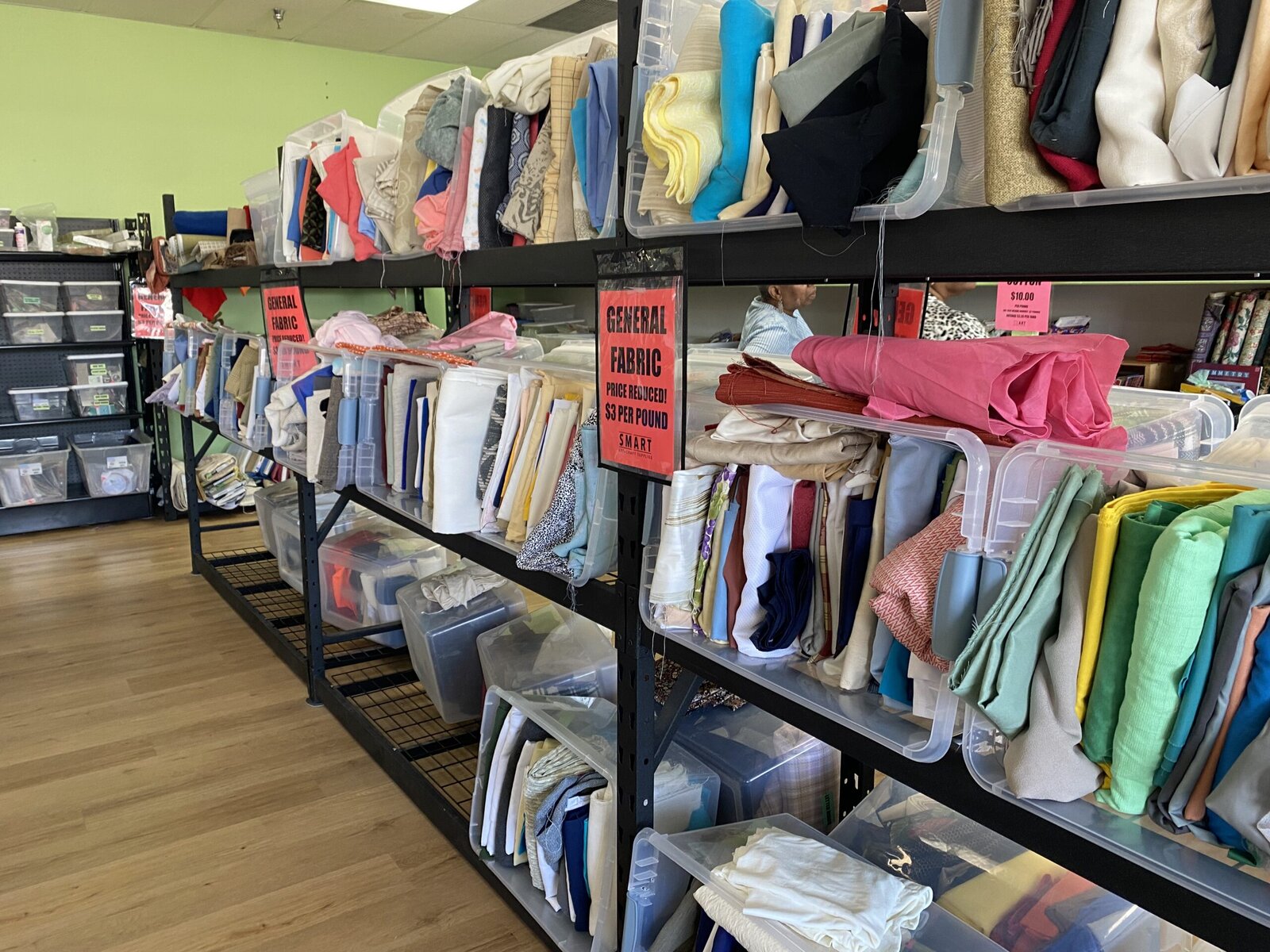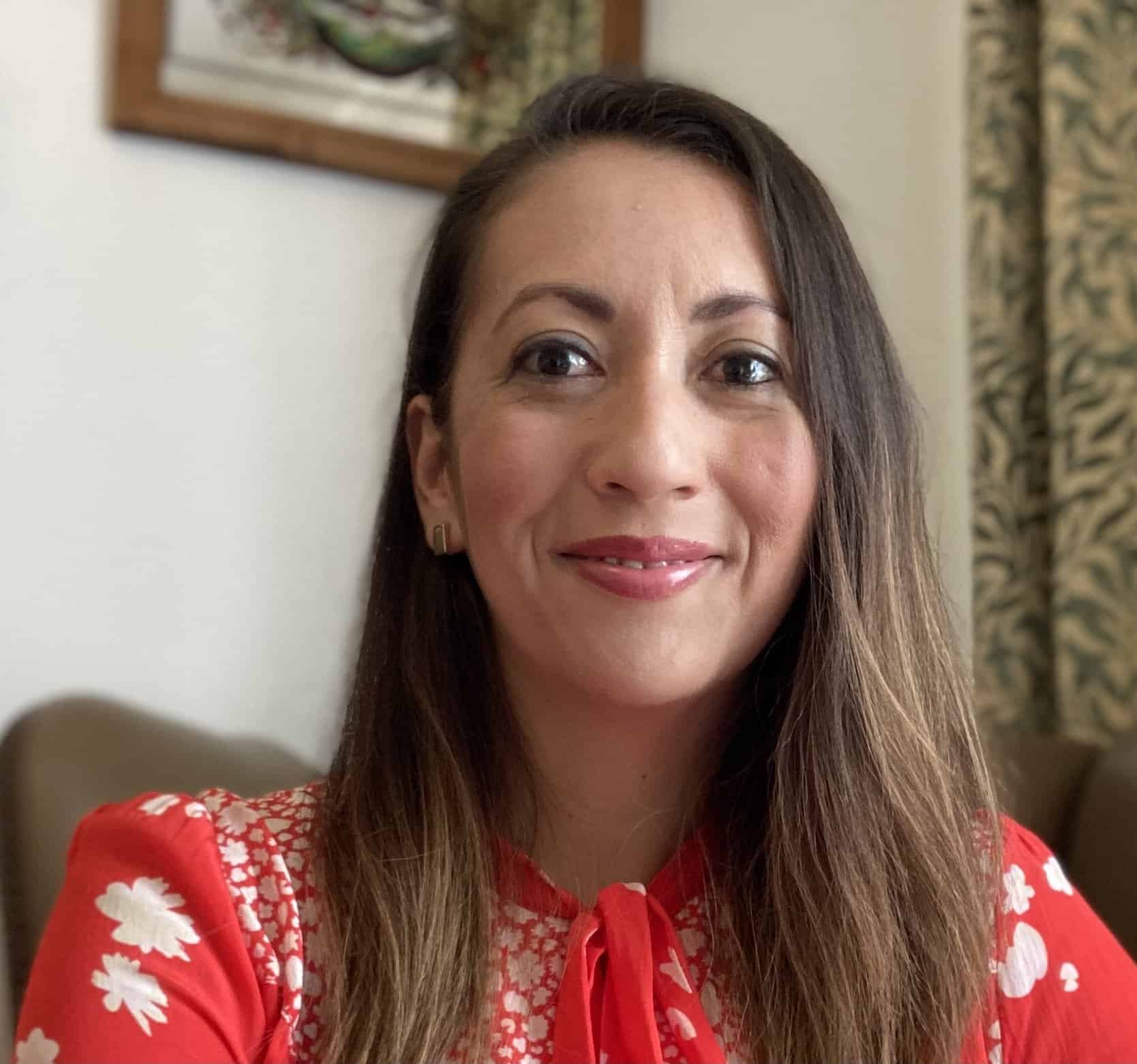“Coming from another country, you find yourself in a completely unusual location and amongst completely different people. Everything is unfamiliar and you, like Alice in Wonderland, walk and watch.”
That’s how Anastasija Kostenko summed up what it was like arriving in Vilnius, Lithuania, in 2022, having traveled over 700 miles to flee the destruction and devastation in Ukraine caused by the Russian invasion.
Needing to start a new life but not knowing where to begin, Anastasija signed up to become a mentee in the city’s BeFriend Vilnius program, run by International House Vilnius, an organization aimed at helping foreign newcomers find a “soft landing.” The program matches foreign mentees with local mentors, with pairs encouraged to meet at least twice a month.

Anastasija’s mentor Rūta and Rūta’s friend helped her navigate what seemed like a never ending array of forms and applications. “Were it not for them, it would have been incredibly difficult to arrange a huge number of documents and top priority issues,” Anastasija told BeFriend Vilnius coordinators.
“It’s been a matter of filling out documents, applying for grants and applying for payments and payment cards. I am sincerely grateful for their help with some really important issues. I would not have understood them myself.”
Anastasija and Rūta, who have not shared last names for privacy reasons, are part of an initial cohort of around 500 Ukrainian mentees and Vilnian mentors. They were matched by BeFriend Vilnius during the first iteration of the program in 2022, initially designed to help the influx of Ukrainians find their footing amidst a new culture and language.
Weighed down by negative news?
Our smart, bright, weekly newsletter is the uplift you’ve been looking for.With a population of around 86,000, Ukrainians are now the largest foreign community in Lithuania, making up around 3.2 percent of the country’s overall population of about 2.7 million.
For International House Vilnius project manager Agnė Goldbergaitė, who has been project manager at BeFriend Vilnius since the beginning, the original idea was not only to make Ukrainian refugees feel more at home in Lithuania, but also to find a social way of fielding the inevitable influx of questions around basic information.
“When Ukrainians first started coming to Lithuania, there was a huge flow of people needing all kinds of information, like how to register for a doctor’s appointment, how to find a school for their children, how to buy tickets for the public buses or even where to drink coffee,” says Goldbergaitė. “They were really just in need of a friend.”

“We decided that they could register with us, and share a bit more about themselves, whether they are a single mom with two kids, or a young woman who is into photography. We then connect them with a local Vilnian with a similar situation or interests, to try and lift some of that burden from the government institutions that are also taking care of them. So many of our first mentors joined because they wanted to help Ukrainian people coming from the war.”
Another mentor/mentee pair is Irina and Jovita. Irina came from Ukraine with her eight-year-old daughter, and she met Jovita within a week of her arrival in Lithuania. Jovita’s 11-year-old son comes up with the activities and meeting places, and while the moms are able to communicate in Russian, the kids speak to each other in English, supplemented with hand gestures.
Meanwhile, mentor Kristina was initially anxious about whether she could provide the help her mentee, Iryna, would need. But when they met, she was reassured to hear that Iryna was simply looking for someone to talk to. “I’ve met a great person who I’m now very happy to call my friend,” she told the program. Vilnius local Jurga has also been offering in-depth emotional support to Ukrainian Eteri, and the two have developed a strong bond.
Seeing how well the program has worked, coupled with Vilnius’ overall increasing attractiveness to migrants, the BeFriend Vilnius team expanded the program last year to all foreign newcomers. It also moved away from the time-consuming process of hand-matching mentors and mentees, instead developing a website with the ability to match pairs based on their circumstances and interests. Since the initial launch, BeFriend Vilnius has been receiving up to 15 applications per week for mentors and mentees.

“We realized this would actually be the best thing for all foreigners. There are around 73,000 international people living in Vilnius at the moment, making every ninth Vilnius resident a foreigner. Our city is becoming more international,” says Goldbergaitė.
“Every time we host an event, we’re surprised at how many different countries people come from — Zimbabwe, Nigeria, Ecuador, Philippines, Indonesia, Kazakhstan, Georgia — all kinds.”
The number of foreigners living in Lithuania has risen rapidly, totaling 203,157 as of September 2023, up from the 145,118 recorded in 2022. This is partly due to local marketing efforts. The tongue-in-cheek “Vilnius: the G-Spot of Europe” campaign hit global headlines, while government-funded organizations Work in Lithuania and Invest Lithuania have made it their mission to attract skilled foreign workers to the country. Visa processing times have been cut from eight months to just one, and there’s even an arrival allowance of €3,444 (around $3,764) awarded to migrants in high-value occupations considered to be in local shortage.
Quality of life in Lithuania also appeals to migrants: It’s in the top 25 percent of the world’s safest countries and has 15 public holidays a year, the second-highest number in the EU. Just one percent of employees work very long hours — well below the OECD (Organization for Economic Cooperation and Development of 38 countries) average of 10 percent — ranking it 11th for work-life balance in this group.
The next evolution of BeFriend Vilnius will be to complement the mentoring initiative with a more formal integration program of events and seminars.
“Vilnius is super compact and understandable, and if you take just two steps outside the city, you’re in the forest. Everyone speaks English, and most people do love it,” says Goldbergaitė. “We want people to fall in love with Vilnius and thrive here. We’re always excited to have an impact on real people, and build our community.”











